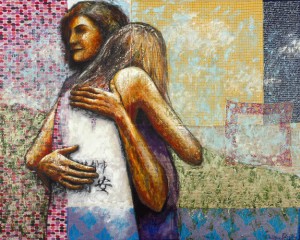"The weak can never forgive. Forgiveness is the attribute of the strong."
- Mahatma Gandhi
We’ve all heard the expression “forgive and forget.” For most people, it seems, that expression only applies to other people. We’re supposed to give loved ones, whether they be friends, family members, partners, or others, second chances. And that can be a struggle, especially when we have been wronged. But I’ve learned that one of the hardest things to do is to forgive yourself for mistakes that you’ve made. My first year was my worst. Hands-down. UofT intimidated me. I can still remember walking into Con Hall and thinking “there are more students in this one class than in my entire high school.” I lived in residence but homesickness took over within a few weeks. I struggled through my courses and felt a little lost on campus. It wasn’t until the end of Year 1 that I decided to talk to someone.
I booked an appointment with my registrar’s office and walked my advisor through my issues. I asked her to fix my situation. To make it right. I wanted her to give me a step-by-step solution to all my troubles. I wanted her to turn back time.
What she said to me completely through me off because it was so unexpected and seemed so irrelevant. She looked me in the eye and asked me “If your best friend came to you with this issue, what would be the first thing that you say?”
I wasn’t really sure where this was going but I said “I’d tell her not to give up.”
“Oh?”
“Well yeah. I’d tell her to cut herself some slack. Everyone makes mistakes. And she’s resourceful enough to recover from a setback.”
And then she said “So why can’t you say that to yourself? Why doesn’t that apply to you?”
I think that was one of the first times I realized that it’s okay to make mistakes. To not have everything figured out. Forgiving yourself doesn’t mean that you don’t have to deal with the consequences of your actions (and yes, there will be consequences). It just means that those consequences don’t have to include shame, guilt, or depression.
I remember asking my advisor “if I’m not hard on myself, won’t people think that I’m not taking my situation seriously?”
She pointed out “do you think that your loved ones want you to be moping around? Or do you think they’d prefer it if you were resourceful and found a way to rectify your situation?”
“Maybe I should change my study habits.”
“And you will. But before you can do that, you need to move on. And the only way to do that is to forgive yourself.”
My first year was my worst. Hands-down. UofT intimidated me. I can still remember walking into Con Hall and thinking “there are more students in this one class than in my entire high school.” I lived in residence but homesickness took over within a few weeks. I struggled through my courses and felt a little lost on campus. It wasn’t until the end of Year 1 that I decided to talk to someone.
I booked an appointment with my registrar’s office and walked my advisor through my issues. I asked her to fix my situation. To make it right. I wanted her to give me a step-by-step solution to all my troubles. I wanted her to turn back time.
What she said to me completely through me off because it was so unexpected and seemed so irrelevant. She looked me in the eye and asked me “If your best friend came to you with this issue, what would be the first thing that you say?”
I wasn’t really sure where this was going but I said “I’d tell her not to give up.”
“Oh?”
“Well yeah. I’d tell her to cut herself some slack. Everyone makes mistakes. And she’s resourceful enough to recover from a setback.”
And then she said “So why can’t you say that to yourself? Why doesn’t that apply to you?”
I think that was one of the first times I realized that it’s okay to make mistakes. To not have everything figured out. Forgiving yourself doesn’t mean that you don’t have to deal with the consequences of your actions (and yes, there will be consequences). It just means that those consequences don’t have to include shame, guilt, or depression.
I remember asking my advisor “if I’m not hard on myself, won’t people think that I’m not taking my situation seriously?”
She pointed out “do you think that your loved ones want you to be moping around? Or do you think they’d prefer it if you were resourceful and found a way to rectify your situation?”
“Maybe I should change my study habits.”
“And you will. But before you can do that, you need to move on. And the only way to do that is to forgive yourself.”
 I remember walking out of the registrar’s office with a sense of relief. I didn’t have a step-by-step solution to my problem like I’d hoped. But I figured out a way to re-channel my time and energy to improving my situation instead of beating myself up over it.
I think, in the midst of the expectations that others have for us and those that we have for ourselves, we forget that we are human. That we fail. And that presents one of the biggest barriers to letting go of the past and moving on. Reminding ourselves that we are worthy of forgiveness is half the battle.
I remember walking out of the registrar’s office with a sense of relief. I didn’t have a step-by-step solution to my problem like I’d hoped. But I figured out a way to re-channel my time and energy to improving my situation instead of beating myself up over it.
I think, in the midst of the expectations that others have for us and those that we have for ourselves, we forget that we are human. That we fail. And that presents one of the biggest barriers to letting go of the past and moving on. Reminding ourselves that we are worthy of forgiveness is half the battle.
 Till next time,
Ishita
Till next time,
Ishita
Great read, very relateable! Thanks!
Thanks for reading! Hope it reminded you not to be too hard on yourself 🙂
In the sentence “What she said to me completely through me off because it was so unexpected and seemed so irrelevant.”, it should read “threw” rather than “throw”.